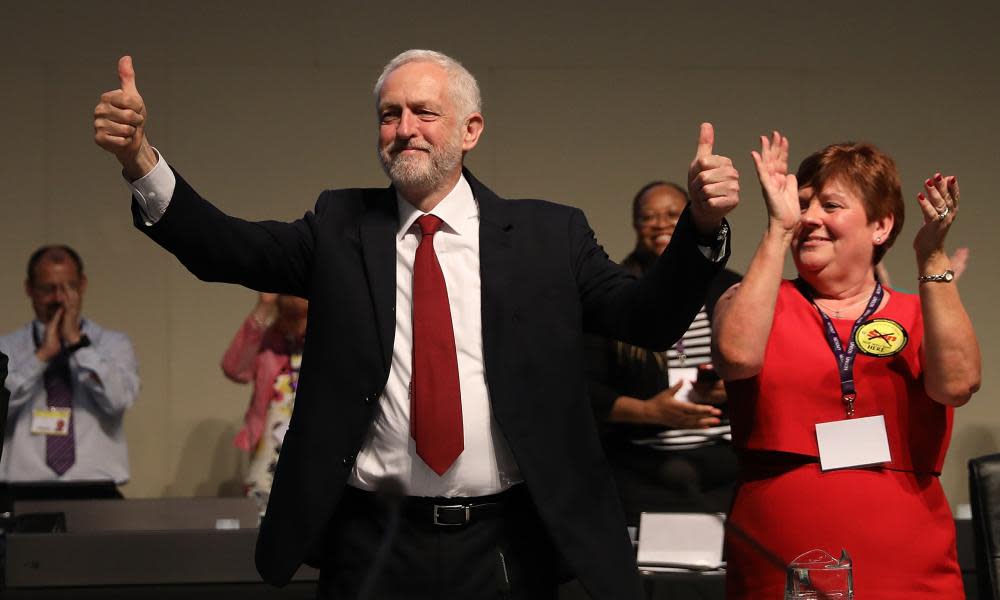Labour did well and can do even better | Letters

Martin Kettle’s piece on the electoral support Labour has yet to win (Corbyn’s Labour has done well. To win power it needs to do far better, 23 June) follows the Ipsos-Mori analysis on how the country voted. There is no doubt Jeremy Corbyn energised a large number of voters, and not only the young, to support Labour and helped to destroy the Tory Commons majority. However, the increased support tended to come mainly from the more professional and better off.
The Tories had a marked increase when it came to those on lower incomes etc. The five Labour losses, including mine, would be in this category, but there were similar – and sometimes larger – swings to the Tories in other long-held Labour seats, which were absorbed by the previous large majority. There is, as Kettle says, much ground to be covered next time. Labour is usually at its best when it knows electoral victory and progressive legislation are within reach.
David Winnick
London
• Owen Jones is right about not surrendering ground to the enemy (Labour can’t be complacent: the time to mobilise is now, 22 June), and the period that ended with Jim Callaghan formally renouncing Keynesianism could do with a closer look because the rightwing have made “the 70s” a pejorative term. We had much greater military costs then as we struggled to quit our empire and still remain a world player. We were still trying to maintain a sterling area. The unions were indeed over-mighty and it was a Labour government in 1969 that tried to introduce reforms without going to the extremes of Thatcher. These were sabotaged by some of Wilson’s own ministers, notably Callaghan.
The oil shock was a result of our foreign policy. After the Yom Kippur war the Gulf states accused us of knee-jerk support for Israel, as opposed to the Palestinian cause, and tightened the oil taps, causing the price of crude to nearly quadruple. At home, Prime Minister Heath and his chancellor relaxed credit controls and encouraged people to buy houses, resulting in a mini boom and bust. After Denis Healey had gone “cap in hand” to the IMF it was discovered that Whitehall had not done its sums right and we apparently didn’t need as much as we thought, and indeed that debt was paid off pretty quickly. The national debt never got above 50% of GDP during the decade, as opposed to the 85% it stands at after seven years of Tory government.
Given all this, I don’t believe Keynes’s ideas aren’t still relevant. The mishaps of the 70s mostly stemmed from political and economic choices that are now easily seen. Opinion polls at the time showed high levels of satisfaction with people’s lives, in spite of the upheavals. These were the days, after all, when working people saw secure work, adequate social security, package holidays in the sun and car ownership as their birthright.
David Redshaw
Gravesend, Kent
• Notwithstanding the many valid points in his article as he edges back towards relevance in the Corbyn-Labour debate, it is difficult to avoid wondering whether, like Tony Blair, Martin Kettle’s real problem is that he doesn’t want Labour elected on a Corbyn-inspired programme. Of course, Labour must strive to do better – and some of Kettle’s points are relevant to achieving that.
It strikes me though that, like the many pre-election critics of Corbyn who refused to acknowledge any comparison with the situation of social democratic parties across Europe, too many former critics still prefer to focus on a negative without considering the wider context and alternatives. It may well be that Gordon Brown’s pollster Deborah Mattinson is correct in saying “many voters decided to support Labour in spite of Corbyn, not because of him”.
However, there should be a parallel assessment of how many of those who turned out to campaign, contribute (like me) and vote because of Corbyn’s manifesto would have done any of those things for a manifesto presented by any of the candidates promoted to supplant Corbyn. Such a holistic analysis would be evidence of goodwill towards the government prospects of both Labour and Corbyn.
Jim O’Donnell
Brussels
• Join the debate – email guardian.letters@theguardian.com
• Read more Guardian letters – click here to visit gu.com/letters

 Yahoo News
Yahoo News 
